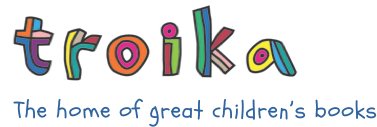"Why life isn’t meant to be fair": Rachel Delahaye on her new book 'Splinters'
Fans of Rachel Delahaye’s gripping fiction will be thrilled to hear that her third book with Troika, Splinters, is now rolling off the printing presses and into a bookshop near you! To mark the book’s release, we caught up with the author to find out more about her thinking behind this incredible story - part teen angst, part adventure, part sci-fi / fantasy, part self-discovery - and more. Over to Rachel…
“Why can’t my life be like that? Life isn’t fair! I wish I could be different….”
When I was a teenager, I remember looking around and coveting what my friends had – longer legs, more relaxed parents, a natural position in the centre of attention. And now, having parented teens, I can see that nothing much has changed! In fact it’s possibly getting worse…. With Instagram providing a ‘Stepford’ presentation of perfect lives everywhere – young adults advertising their incredible travel destinations, fashion hauls and house parties – it’s no wonder depression and anxiety are on the rise and that most regular teenagers feel that life isn’t remotely fair, or that they’re doing something seriously wrong if their life isn’t pitch perfect.
This, in essence, is what Splinters is all about: the teen conviction that ‘life is not going my way’. It’s a natural state. When children hit secondary school, the focus is not so much on studies but self: what people think of us, what we look like, how we act. And when we put ourselves at the centre of everything with only a limited radius of wider visibility, we often fail to see the bigger picture. And it’s the big picture – the full complexity of life and love – that reveals there’s no such thing as a ‘fair life’. At least not in the way that most of us tend to frame it.
What is ‘fair / not fair’?
Fairness, boiled down, and in the specific context of the teen complaint, is basically about getting what you want. And when we see others getting it, it distorts our view and makes us think that others have it better – they’ve somehow landed in a more fortunate place. But what works for someone else doesn’t always work for you. Moreover, what we don’t see when we look at others is the side that they hide and the problems they experience that are eclipsed by our envy of them. We compare our insides with other people’s outsides and that’s never a ‘fair’ comparison!
In Splinters, I really wanted to examine this closely – to hold up a mirror (as it were) to that perception of fairness – and it starts with Jean, on the cusp of her life falling apart. Jean’s best friend Jodie moves away, her mum and dad are being annoying, her parents then buy a new house which she hates, and finally, her boyfriend starts being inexplicably distant, almost as if he were another person. The scene is set for a huge sense of unfairness. Despite these events just being part of life, for Jean, they are life itself, and of course she takes it all very personally. And then she finds a mirror, which turns out to be no ordinary mirror…
“No life is perfect”
An obvious representation of self-refection, the mirror shows Jean other versions of herself in worlds where different decisions were made. And these decisions affect everything from family dynamics to Jean’s own identity. When she starts to look too deeply into those worlds, she encounters alternative realities that she longs for, and alternative personalities that draw her into worlds of trouble.
After being involved in a tragic accident, Jean spirals – her self-reflection taking her to dark places – but before she loses herself completely, she needs to discover that fairness itself is a mirage and that making the most of what we have is perhaps the only way of creating contentment in the world in which we find ourselves. What’s more, how we deal with the ‘unfair’ parts of life is what builds our resilience and our priorities, and also creates experiences that are enriching in themselves, even though we may not have chosen them. Unfairness isn’t undesirable, then, it’s necessary. Without it we don’t grow, and we don’t know what we’re made of!
Splinters isn’t a condescending lecture about life. I’m not putting our teens in a box labelled ‘self-obsessed’ and assuming they’re spoilt and blinkered. Indeed, although our priorities change as we age (I now covet early nights and elasticated waistbands), I don’t think the feeling that the grass might be a bit greener elsewhere ever leaves us. A few lucky souls might consider the stuff beneath their feet adequately lush, but many of us often wonder about the choices that led us to where we are and how things might have been different, or how an adjustment in timing or decision-making could have created other outcomes. The only difference between grown-ups and teens, really, is that adults know that there’s a strong likelihood that the seemingly bright and dazzling grass over there is either fake or filter. They understand, through hard-won experience, that no life is perfect.
Splinters offers romance, adventure, sadness, discomfort, friendship and joy. It’s a representation of life’s offerings. The only catch being that you can’t have one without the others. That’s fair, right?
Find out more and buy the book: www.troikabooks.com/splinters


